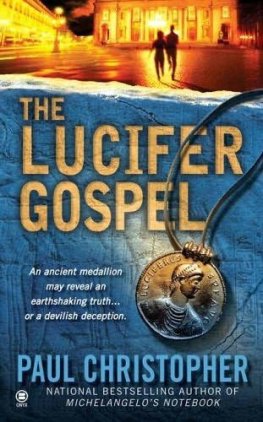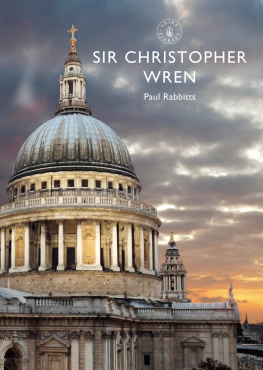Paul Christopher - Michelangelo_s Notebook
Here you can read online Paul Christopher - Michelangelo_s Notebook full text of the book (entire story) in english for free. Download pdf and epub, get meaning, cover and reviews about this ebook. genre: Detective and thriller. Description of the work, (preface) as well as reviews are available. Best literature library LitArk.com created for fans of good reading and offers a wide selection of genres:
Romance novel
Science fiction
Adventure
Detective
Science
History
Home and family
Prose
Art
Politics
Computer
Non-fiction
Religion
Business
Children
Humor
Choose a favorite category and find really read worthwhile books. Enjoy immersion in the world of imagination, feel the emotions of the characters or learn something new for yourself, make an fascinating discovery.
- Book:Michelangelo_s Notebook
- Author:
- Genre:
- Rating:4 / 5
- Favourites:Add to favourites
- Your mark:
- 80
- 1
- 2
- 3
- 4
- 5
Michelangelo_s Notebook: summary, description and annotation
We offer to read an annotation, description, summary or preface (depends on what the author of the book "Michelangelo_s Notebook" wrote himself). If you haven't found the necessary information about the book — write in the comments, we will try to find it.
Michelangelo_s Notebook — read online for free the complete book (whole text) full work
Below is the text of the book, divided by pages. System saving the place of the last page read, allows you to conveniently read the book "Michelangelo_s Notebook" online for free, without having to search again every time where you left off. Put a bookmark, and you can go to the page where you finished reading at any time.
Font size:
Interval:
Bookmark:
Paul Christopher
Michelangelo_s Notebook
July 22, 1942, La Spezia,
The Ligurian Coast,
Northern Italy
Maggiore Tiberio Bertoglio, wearing the uniform of one of the Mussolini Black Brigades-complete with ebony shoulder boards, bloodred-and-silver double-M collar tabs and a silver-and-black skull-and-crossbones insignia on the forepeak of his regulation bustina-sat in the backseat of the dusty Lancia staff car, arms crossed over his chest Il Duce- style, not feeling half as grand as he looked. The uniform was a fraud. He was not in the army at all but in the much reviled OVRA, the Organizzazione di Vigilanza Repressione dellAntifascismo-the Organization for Vigilance Against Anti-Fascism: Mussolinis secret police, the Italian gestapo.
Hed flown up from Rome in a cranky old Savoia-Marchetti SM.75 that morning, the old bluebird insignia of Ala Littoria still faintly visible just behind the triple black axe fasces of the Italian air force on the tail. After four bumpy hours in the air hed arrived at the La Spezia naval base, borrowed the staff car and a driver and was now almost at the end of his journey.
The driver took them through the narrow, winding streets of Portovenere, working their way down to the fishing port at La Grazie. The immense bulk of the twelfth-century Castello Doria was at his back, built eight hundred years before to guard the approaches to the Gulf of Spezia and still doing its job. In the protected gulf itself Bertoglio could see half the Italian navy at anchor, including the huge battleship Andrea Doria and its sister ship, the Giulio Cesare. Battered and blackened but still afloat.
The staff car finally reached the crumbling old dock and Bertoglio stepped out of the oversized, sand-colored jeep and gave the driver a quick, boot-snapping Fascisti salute.
Be back in half an hour, no more, Bertoglio ordered.
Certainly, Maggiore. Half an hour.
The driver nodded, put the battered Lancia in gear and drove off. On the heavily treed island of Palmaria, half a mile away across the bay that marked the harbor for the fishing village, he could see the long low building that marked the convent of San Giovanni All Orfenio. It stood almost on the shore with a small cement dock of its own, a large, ancient dory tied up to an old black iron bollard. Bertoglio looked around and finally spotted a small fishing boat tied up a few yards away, its owner smoking and talking to another man.
How much to take me across to the convent? Bertoglio asked stiffly. The fisherman looked him up and down, eyeing the majors curling single stripe on his arm and the Mussolini brigade tabs.
Why do you want to go over there? the old man asked. His brown rheumy eyes took in the black forage cap and the deaths-head insignia. He didnt appear to be impressed.
I have business there, old man. Now, how much to take me in your boat?
To take you, or to take you there and back?
There and back, Bertoglio snapped. You will wait at the dock. I will have a passenger.
That will be extra.
Why am I not surprised, old man?
The other man smiled and spoke for the first time. Every time you call him old man the price goes up. He thinks he is as young as a goat, this one. All the nuns want to fuck him, he is sure of it.
I leave the fucking of nuns to that priest Bertole, said the old man, laughing, showing the stumps of half a dozen brown teeth. He may like screwing old women with mustaches, but I prefer the young little ostrica you find on the promenade.
As though they would prefer you!
How much, Bertoglio interrupted.
That depends on how much you have.
It is only two hundred yards.
You are the Christ, Maggiore. You can walk on water?
Bertoglio reached into the pocket of his jacket and took out a wad of lire, peeling off half a dozen notes. The old man cocked an eyebrow and Bertoglio peeled off half a dozen more.
Good enough, said the old man. He made a sweeping gesture with one gnarled hand. Step into my princely gondola and I will guide you across the waters to the convent.
Bertoglio made his way into the boat awkwardly and eased down onto the rear thwart. The old man climbed in after him and unshipped the long oars. He used one to push away from the dock, put both into their locks and began stroking strongly away from the pier. Bertoglio sat stiffly in the rear of the boat, his hands gripping the gunwales, feeling slightly queasy as they went farther out into the bay. There was a large bucket close by with something brown and gelatinous floating in it. The contents of the bucket stank and Bertoglios already nervous stomach began to heave.
Squid heads, the old man explained. You trap them when they start to copulate and rise to the surface in their passion. You behead them before they have a chance to spray their sperm and then keep them in the sun for a day or two. Better bait that way.
Bertoglio said nothing. Ahead of them the convent drew closer. It was a long, low building, built with an odd step in it to conform to its rocky setting. There was a steep meadow behind, and within what he took to be a white-painted wrought iron fence there was a small cemetery plot, shaded by several stunted olive trees and sparsely planted with a few simple stones and crosses.
The old man hauled on his starboard oar, sliding around the slim uprights marking sardine and herring weirs built to catch the meandering schools on the incoming tide, then pulled straight for the small dock in front of the convent. As they approached the pier a thin, elderly woman in a dark blue habit and with a white wimple framing her narrow face came out of the front door of the building and walked down to the dock, hands tucked into her sleeves. She stood there waiting calmly as Bertoglio approached. For a moment he felt frightened and ashamed as he had been as a child when creatures like these were the center of his universe and ruled it with a hawthorn switch. That, combined with the roiling of his stomach, made him feel distinctly uneasy as he stepped up out of the fishermans small boat and onto the dock. The woman stared at him, then turned without a word. She walked back up to the convent, Bertoglio close behind. A moment later he followed her into the coolness of the stone building. It was dark; there appeared to be no artificial light. Bertoglio blinked. The old nun crossed a plain vestibule unmarked by any ornament then turned into what appeared to be some kind of common room outfitted with several shelves of books, a large plank table, a few chairs and a fieldstone fireplace. There was a single window, its shutters closed, and through the broad louvers Bertoglio could see down to the narrow beach and the dock. The old fisherman had disappeared and could be seen halfway across the bay.
Bertoglio cursed. Caccati in mano e prenditi a schiaffi! He pounded one fist into his palm.
Did you say something, Major?
A short, pleasant-faced nun in her forties stepped out of the shadows on the far side of the fireplace. Unlike the elderly sister who had led him here, this nun wore a heavy circlet of carved wooden beads around her ample waist and a large metal cross hung on a chain around her neck, cutting down between her large, pendulous breasts.
I said nothing, said Bertoglio. Who might you be? he asked rudely, sticking his chin out in an unintentional mockery of Il Duce.
I am the mother superior, Sister Benedetta. You presumably are the man they said would be coming.
I am Maggiore Tiberio Bertoglio, Sixth MVSN Division Tevere, Bertoglio snapped.
I was expecting someone from the secret police, said Sister Benedetta.
There is no secret police in Italy, said Bertoglio.
And you are not really here, Maggiore. You are a figment of my imagination. The woman smiled wearily. I suppose the tedeshi Gestapo is enough for both countries.
Font size:
Interval:
Bookmark:
Similar books «Michelangelo_s Notebook»
Look at similar books to Michelangelo_s Notebook. We have selected literature similar in name and meaning in the hope of providing readers with more options to find new, interesting, not yet read works.
Discussion, reviews of the book Michelangelo_s Notebook and just readers' own opinions. Leave your comments, write what you think about the work, its meaning or the main characters. Specify what exactly you liked and what you didn't like, and why you think so.









